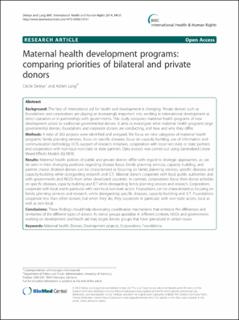Please use this identifier to cite or link to this item:
https://doi.org/10.21256/zhaw-3154| Publication type: | Article in scientific journal |
| Type of review: | Open peer review |
| Title: | Maternal health development programs : comparing priorities of bilateral and private donors |
| Authors: | Deleye, Cécile Lang, Achim |
| et. al: | No |
| DOI: | 10.21256/zhaw-3154 10.1186/s12914-014-0031-x |
| Published in: | BMC International Health and Human Rights |
| Volume(Issue): | 14 |
| Issue: | 31 |
| Issue Date: | 19-Nov-2014 |
| Publisher / Ed. Institution: | BioMed Central |
| ISSN: | 1472-698X |
| Language: | English |
| Subject (DDC): | 618: Gynecology, obstetrics and midwifery |
| Abstract: | Background: The face of international aid for health and development is changing. Private donors such as foundations and corporations are playing an increasingly important role, working in international development as direct operators or in partnerships with governments. This study compares maternal health programs of new development actors to traditional governmental donors. It aims to investigate what maternal health programs large governmental donors, foundations and corporate donors are conducting, and how and why they differ. Methods: A total of 263 projects were identified and analyzed. We focus on nine categories of maternal health programs: family planning services, focus on specific diseases, focus on capacity building, use of information and communication technology (ICT), support of research initiatives, cooperation with local non-state or state partners and cooperation with non-local non-state or state partners. Data analysis was carried out using Generalized Linear Mixed-Effects Models (GLMER). Results: Maternal health policies of public and private donors differ with regard to strategic approaches, as can be seen in their diverging positions regarding disease focus, family planning services, capacity building, and partner choice. Bilateral donors can be characterized as focusing on family planning services, specific diseases and capacity-building while disregarding research and ICT. Bilateral donors cooperate with local public authorities and with governments and NGOs from other developed countries. In contrast, corporations focus their donor activities on specific diseases, capacity-building and ICT while disregarding family planning services and research. Corporations cooperate with local and in particular with non-local non-state actors. Foundations can be characterized as focusing on family planning services and research, while disregarding specific diseases, capacity-building and ICT. Foundations cooperate less than other donors; but when they do, they cooperate in particular with non-state actors, local as well as non-local. Conclusions: These findings should help developing coordination mechanisms that embrace the differences and similarities of the different types of donors. As donor groups specialize in different contexts, NGOs and governments working on development and health aid may target donors groups that have specialized in certain issues. |
| URI: | https://digitalcollection.zhaw.ch/handle/11475/17699 |
| Fulltext version: | Published version |
| License (according to publishing contract): | CC BY 4.0: Attribution 4.0 International |
| Departement: | School of Management and Law |
| Organisational Unit: | Institute of Public Management (IVM) |
| Appears in collections: | Publikationen School of Management and Law |
Files in This Item:
| File | Description | Size | Format | |
|---|---|---|---|---|
| Maternal Health_2014_SC 1.1.pdf | 447.75 kB | Adobe PDF |  View/Open |
Show full item record
Deleye, C., & Lang, A. (2014). Maternal health development programs : comparing priorities of bilateral and private donors. BMC International Health and Human Rights, 14(31). https://doi.org/10.21256/zhaw-3154
Deleye, C. and Lang, A. (2014) ‘Maternal health development programs : comparing priorities of bilateral and private donors’, BMC International Health and Human Rights, 14(31). Available at: https://doi.org/10.21256/zhaw-3154.
C. Deleye and A. Lang, “Maternal health development programs : comparing priorities of bilateral and private donors,” BMC International Health and Human Rights, vol. 14, no. 31, Nov. 2014, doi: 10.21256/zhaw-3154.
DELEYE, Cécile und Achim LANG, 2014. Maternal health development programs : comparing priorities of bilateral and private donors. BMC International Health and Human Rights. 19 November 2014. Bd. 14, Nr. 31. DOI 10.21256/zhaw-3154
Deleye, Cécile, and Achim Lang. 2014. “Maternal Health Development Programs : Comparing Priorities of Bilateral and Private Donors.” BMC International Health and Human Rights 14 (31). https://doi.org/10.21256/zhaw-3154.
Deleye, Cécile, and Achim Lang. “Maternal Health Development Programs : Comparing Priorities of Bilateral and Private Donors.” BMC International Health and Human Rights, vol. 14, no. 31, Nov. 2014, https://doi.org/10.21256/zhaw-3154.
Items in DSpace are protected by copyright, with all rights reserved, unless otherwise indicated.